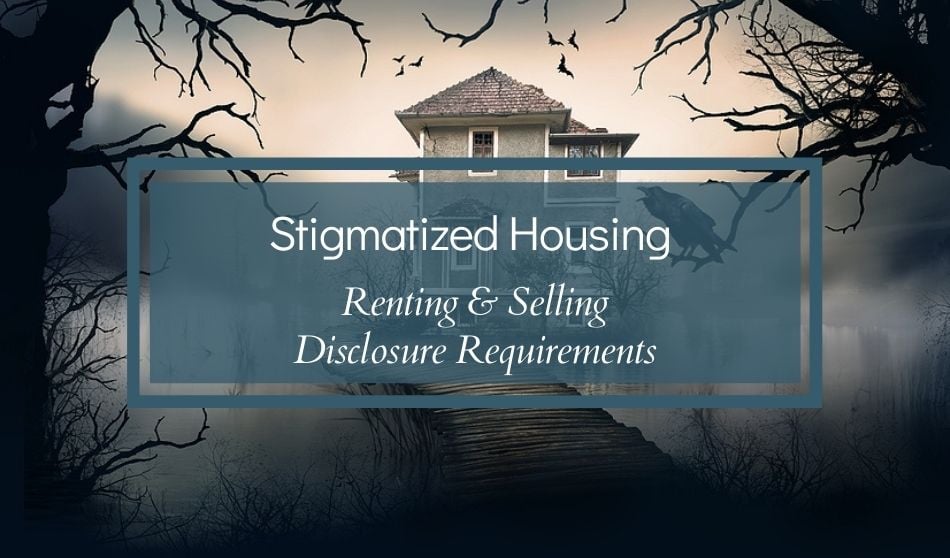
Stigmatized Property Questions Answered — If you knew something horrible happened in or near your house would you still have chosen to live there? Was it the obligation of the real estate agent or landlord to disclose that stigmatized property to allow you the opportunity to decline to purchase or lease?
Tenants and homebuyers need to know what disclosures to expect and the types of questions to ask. Likewise, agents and landlords need to know which stigmatized housing disclosures are required and how to handle inquiries. This article will explain stigmatized housing and what needs to be disclosed for rental properties and those that are for sale.
What is Stigmatized Housing?
The term ‘stigmatized properties’ is used to describe properties that some renters and homeowners may find undesirable for emotional, psychological or even personal reasons. Of course, emotions vary from person to person and preferences are subjective. For that reason, some states have set standards, rules, and regulations for agents and property managers to follow when presenting a home for sale or rent.
Types of Stigmatized Properties
Reasons a buyer or renter may consider a property stigmatized vary from serious events to trivial annoyances. Two of the most concerning are criminal activity and death. Let’s check out those and other reasons someone may hesitate to purchase or rent:
Stigmatized Property Caused by Criminal Activity
Knowing criminal activity occurred in the home could be very off-putting; especially if the crime was violent. The ramifications of criminal activity can be insidious. For example, a property used to produce or sell drugs can have long-term ramifications. The production of methamphetamines can cause health complications if the home was not properly cleaned by a certified hazardous cleanup crew. Not to mention, drug dealers and users may continue to approach the home in search of product to buy.
Housing Stigmatized Because of a Death
A death may occur in a home by natural causes or from criminal activity. Either way, often stigma follows. There may be less stigma when someone passes from a health concern than from suicide or homicide. But even from natural causes, distance of time since the death may impact decisions to rent or buy. There’s a big difference between a historical event compared to a more recent incident.
Famous or Infamous Home Concerns
A home may have been used during a sensational crime or a prop for a Hollywood production. Whether famous or infamous, new occupants may suffer the nuisance from gawkers, added street traffic, and potential trespassing.
Paranormal and Haunted Houses
There are those that believe homes can be inhabited by spirits of the deceased, demons, angels, and other ethereal beings. Although there may be those who would pay a premium to claim such a home, others would certainly avoid a haunted house at all costs.
Activity Produced by Previous Occupants
A previous resident may have incurred extreme amounts of debt. Debt collectors are often aggressive and tenacious in trying to recoup those funds and may deluge the mailbox with requests or even show up unexpectedly.
In a similar vain as a debt stigma, if the previous occupants ran a home-based business, you might expect to get unwanted solicitations, mail, and visitors.
Other Home Concerns
It may be based on irrational fears or valid objections but there are a few other reasons a home might be passed on by prospective buyers and renters ranging from annoying to concerning such as:
- Location-based issues like a high-crime neighborhood
- Sex offenders and felons within the neighborhood
- Last occupant was terminally ill
- Health concerns such as bed bugs, mold, asbestos, and radon
Federal Disclosures
There is one universal disclosure that both real estate agents and landlords must disclose — the Environmental Protection Agency (EPA) lead-based paint disclosure.
More information can be found here:
- Lead-Based Paint Disclosure Rule (Section 1019 of Title X)
- Real Estate Disclosures about Potential Lead Hazards
- EPA Lead-Based Paint Program Frequently Asked Questions Guide
Conversely, it’s not always about what you can or must disclose. It’s important to also know disclosure restrictions. For example, realtors and landlords should research what information is federally prohibited from disclosing such as death due to AIDS.
Selling Disclosures
A licensed real estate agent will have been educated on the types of disclosures required within their state. In fact, the National Association of Realtors ® details the express or implied duty to discover or disclose pertinent factors in their Code of Ethics.
In that, it is important a seller not knowingly mislead a buyer — and should answer truthfully when asked directly. But they aren’t always required to disclose information. Disclosures required vary greatly by state. Some states have no requirement other than the EPA Lead-based disclosure while other states require to disclose certain deaths and crimes. For example, in California, if a death occurred in the home more than 3 years prior, a seller is not obligated to disclose that information up front, but should if the buyer asks directly.
Sellers should become familiar with their state laws and should check their state statutes and real estate commission or legal council to stay current.
Renting Disclosures
When disclosures are mentioned in the rental industry they are not only referring to stigmatized housing but also to additional information regarding many topics such as security deposit usage, tenants’ rights, etc.
Whether it comes to stigmatized housing or any other rental disclosure, just in keeping with real estate sale disclosures, rental disclosures are very much state-specific.
This handy Landlord Disclosure State Guide can get you started on the research for what disclosures are required:
Landlord Disclosures
What You Have to Tell Your Tenant – State Guide
In addition, landlords and property managers can also contact their state board or local housing authority for further information.
In Summary
All-in-all, disclosure of information comes down to material fact that might affect a decision for most people as well as less important or nonmaterial information that may deter a few. It’s important to uncover the history of your home if you wish to buy, sell, or rent so you have the relevant information to make disclosure decisions based on that history.
Real estate agents and landlords — look closely at your state statutes and regulations prior to disclosing information on the home. Be sure to thoroughly answer any questions a prospect may bring up during the decision-making process. Discretion can be appropriate as long as it is not misleading.
Renters and home buyers — don’t be afraid to ask the tough questions that are important to you making the best choice for your comfort. After all, you will be the one living in that home for hopefully years to come and only you know your comfort level regarding any perceived or actual stigma the home may possess.





